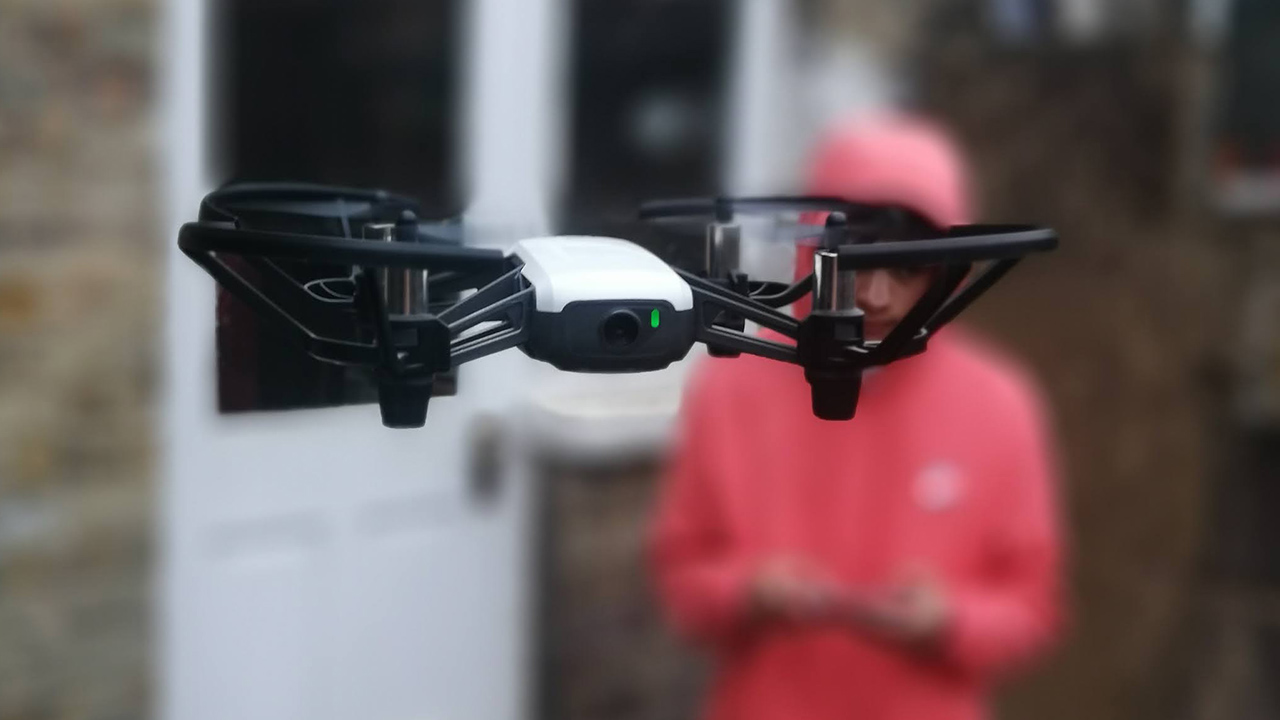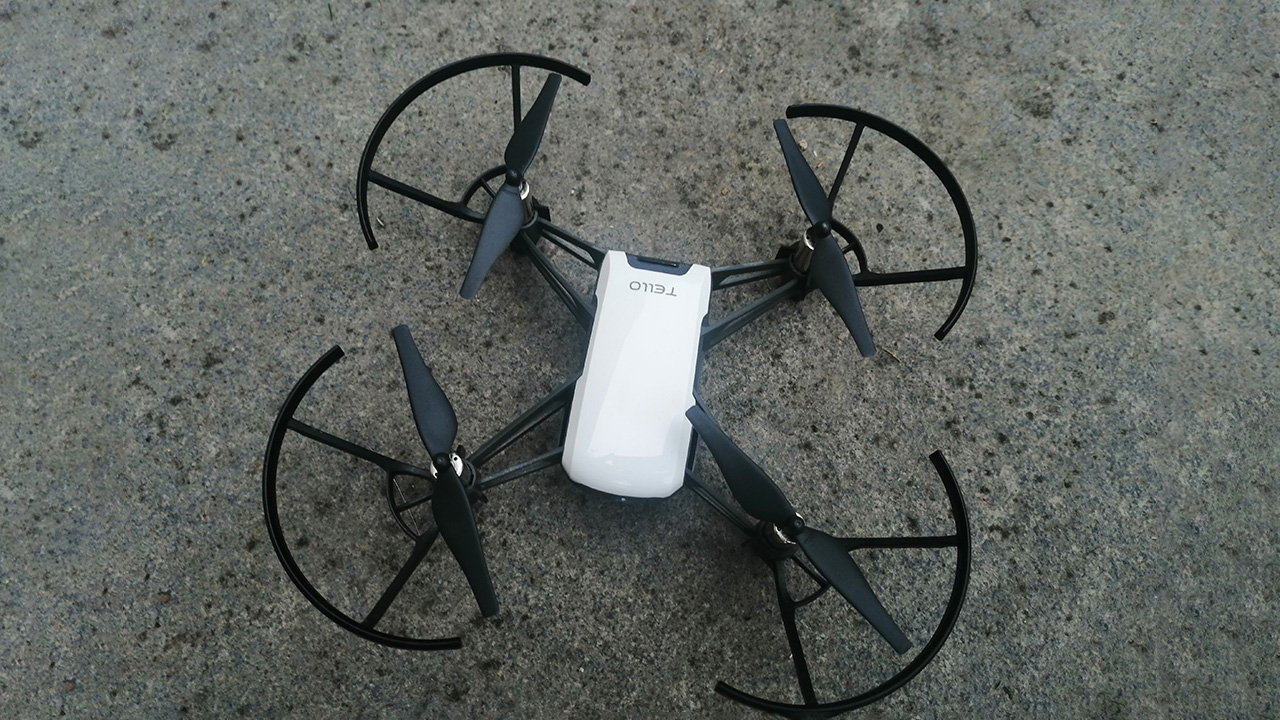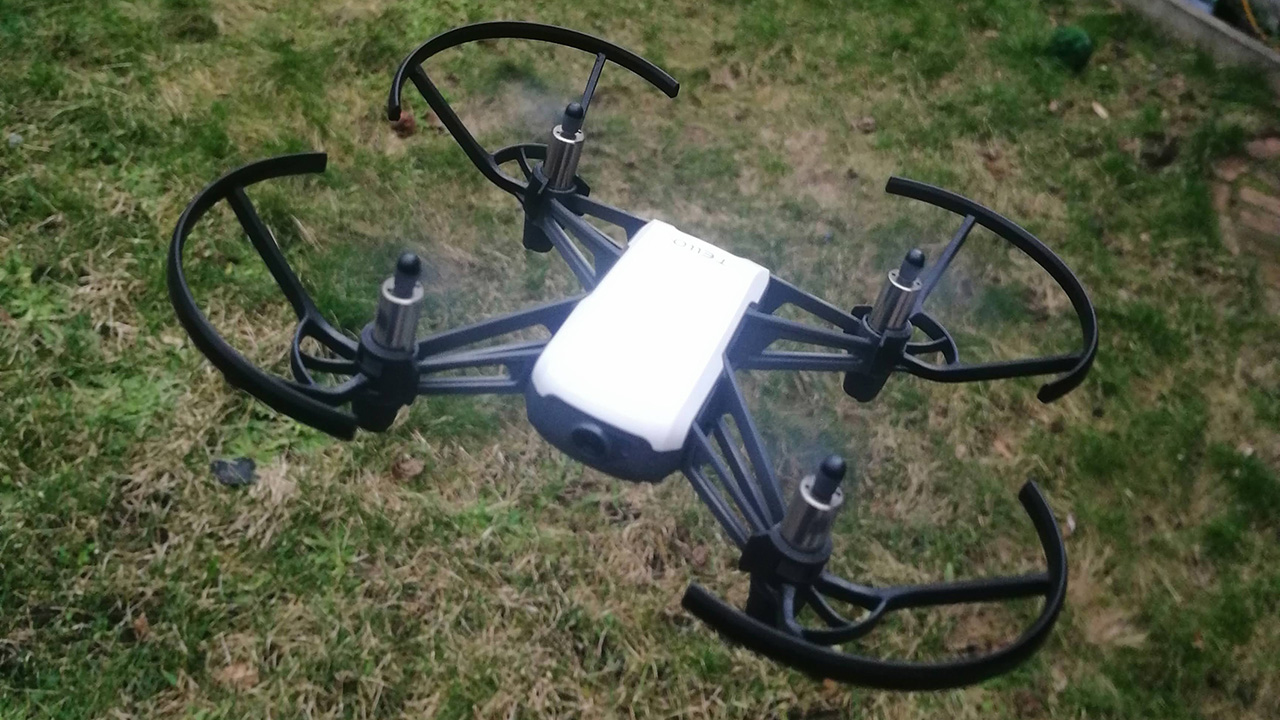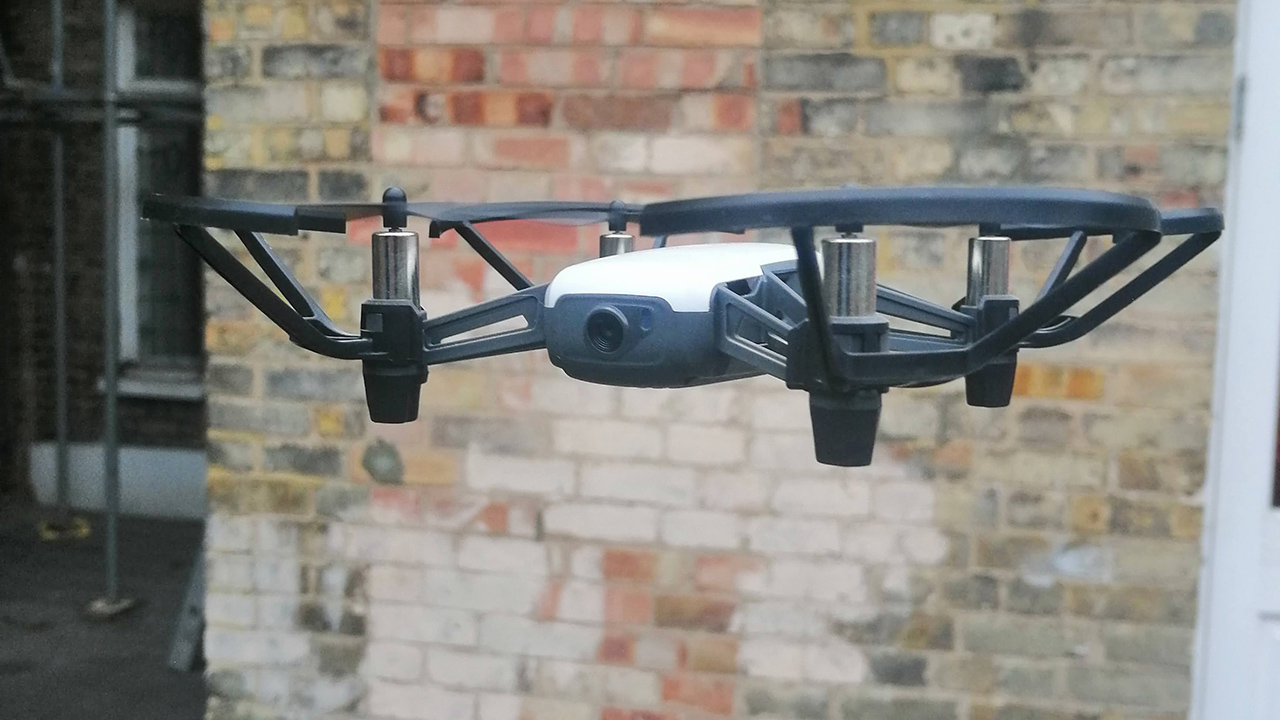Space Verdict
The DJI Ryze Tello is the perfect drone for those only just starting out to fly drones, it’s small, easy to use and the inclusion of propeller guards and onboard sensors makes accidents which damage either the drone or property much less likely, and therefore flying the drone even more enjoyable.
Pros
- +
Easy to fly indoors
- +
Propeller guards
- +
Automatic take off and landing
- +
Onboard collision sensors
Cons
- -
Struggles to hover
- -
Battery charge time to flight time ratio isn’t great
- -
Flying outside is only an option when there is very little wind.
Why you can trust Space.com
The DJI Ryze Tello is a small drone with an onboard nose-mounted camera capable of capturing 5MP photos and streaming 720p HD video. It is a lightweight and affordable quadcopter, perfect for flying indoors ideally suited to newcomers to the hobby. It’s easy to set up, just download the app from the app store, power up and you’re ready to fly. Simple!
This is one drone that really is almost set to fly straight out of the box. Simply download the app to your iPhone or Android phone (or tablet), turn on the drone, connect to the app and you’re ready to go.
The auto take-off feature means you can be up in the air and exploring your living room from a new perspective before you can say "chocks away". Propeller guards make navigation around objects less hazardous, so your Ming vase is (probably) safe. Essentially, this is one of the best beginner drones out there.
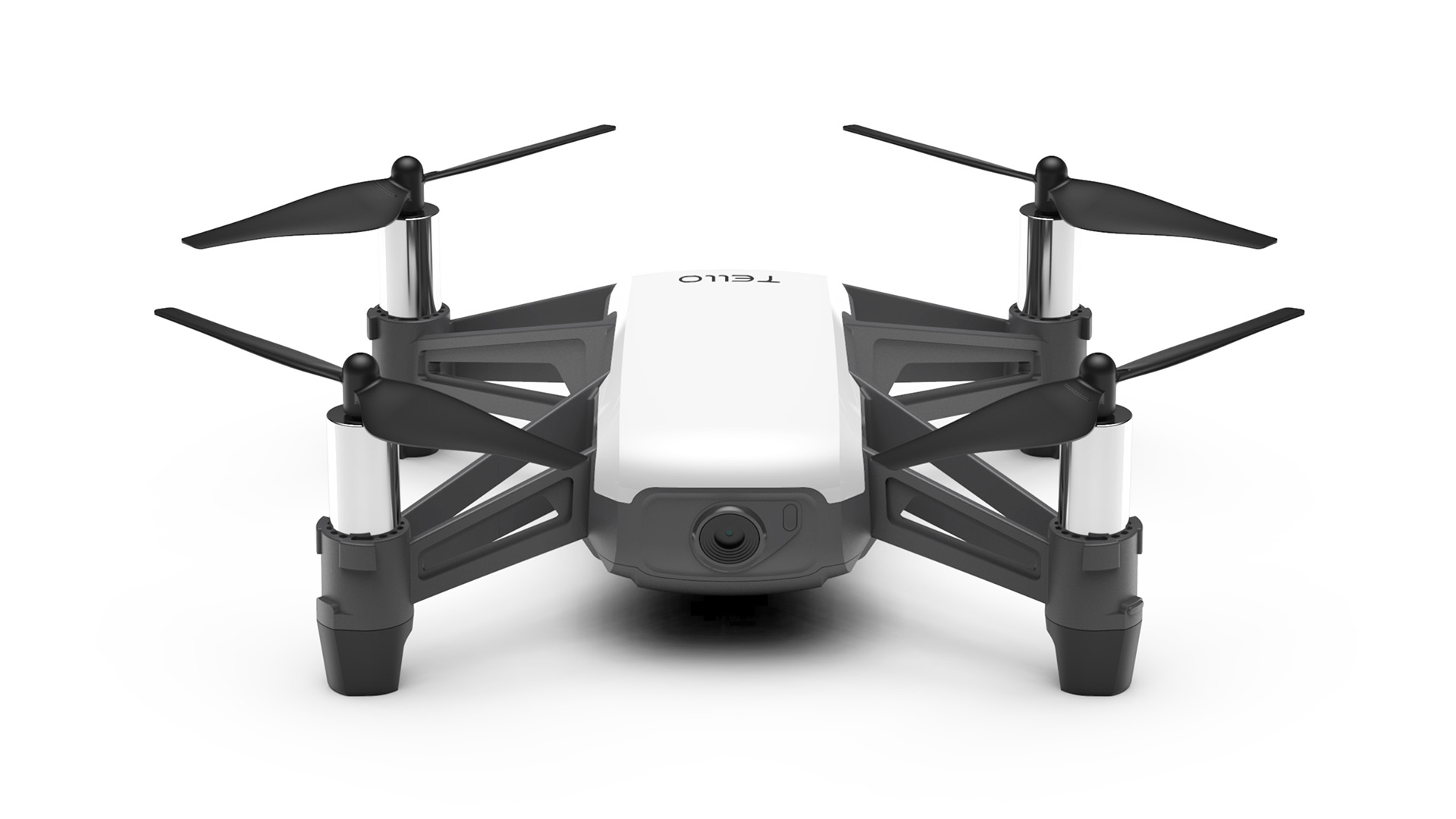
Weight: Approximately 2.8 ounces (including battery and propellers)
Dimensions: 3.6x3.6x1.6 inches
Battery: Detachable Battery- 1.1Ah/3.8V
Charger: Micro USB Charging Port
Modes: Bounce mode, 8D flips, Throw & Go, Up & Away and EZ Shots.
Video transmission range: 100m
Video resolution: HD 720p
Frame rate: 30FPS
The onboard 720p camera allows you to view the world through the eyes of your drone and shoot photos and videos while flying. The flight time is stated as being 13 mins, but we managed just over 11 on the (very compact) full battery. Anything stronger than a very light breeze means that the Tello is not ideal for outside use, but that said on the occasion that we did manage to fly outside it packed a punch in the distance it can fly, and was still under control (if barely visible) when being flown up to 100m away.
The best thing about this drone is its convenience. Its small, compact and lightweight structure means it can almost slip into your coat pocket. Not having to worry about bringing a separate controller means travel with Tello is even easier; perfect to taking on holiday and allowing you to practice your flying skills anywhere.
Compared with many other drones, and particularly those from the DJI stable, the price point is impressive too. Currently you can take your pick of online retailers offering the Tello around the $/£100 mark. This is significantly lower than most high-end drones, and given the build quality and feature set, this price makes it well worth its money. It may not be among the overall best drones, but it's perfect for anyone who wants to dabble in drone photos.
For beginners or complete newbies to the hobby that are looking to begin to fly drones, the Tello could be the go-to drone to learn the basics and get you flying like a professional.
Breaking space news, the latest updates on rocket launches, skywatching events and more!
Ryze Tello: Design
- Very small and sleek design
- Good safety features
- Integrated camera
The small and sleek design of the Tello makes it easy to fly indoors and therefore perfect for beginner drone pilots. The Tello flies smoothly with small tight movements giving it a smooth, accurate flight. Control (through the mobile phone app) is accurate and easy to get the hang of.
The built in safety features, such as the sensor and propeller guards are very discreet and blend in well with the design. The sensors found on the bottom of the drone ( resembling little cameras) are really useful, particularly to beginner drone pilots as help avoid collisions with objects. The propeller guards give the pilots more freedom to attempt risky flight maneuvers with the Tello (especially indoors) and increase its durability by preventing the propellers from damage if the pilot does accidentally fly into an object.
The camera on the Tello is neatly integrated into the drone’s body and barely protrudes, and there is no gimbal mechanism. This significantly reduces the risk of scratching or damaging the camera lens (or gimbal because there isn't one!) The downside to this is that it means that cinematic type buttery smooth footage of the type we have become used to ‘easily’ achieving from other drones (eg. the DJI Mavic 3) is more difficult (but not impossible) to achieve. If you can accept that adding a gimbal would only increase the price and make the drone less beginner-friendly, then the decision to run with this more basic camera set up is justified.
Ryze Tello: Functionality
- Easy to control
- Poor hovering
- Cool ‘trick flight’ features
The Tello is controlled by an app which can be found in the App Store or Google Play. It is very simple to set up, once downloaded, boot up the app, turn the drone on, and press the ‘connect' button. This will take you to WiFi within your settings where you can select "Tello". Now that you are all set up, when you go back to the app you should be able to view your surroundings through the lens of the Tello and you are now ready to take flight.
Despite the Tello being a generally brilliant drone, especially for beginners, it does slightly lack in its quality of flight when it comes to stability when hovering. I often found that shortly after take off the Tello would tend to go on its own little journey and drift off quite quickly. This problem could be a consequence of its lightweight frame or lack of GPS tethering, or maybe its just and slightly less powerful motor/smaller props compared to drones which have been tuned for outdoor flight. But it's a minor issue and easily corrected, and with the reassurance of propeller guards no matter where it drifts off to, you can always be assured that things are unlikely to end in disaster.
The Tello is able to complete quite a few preset aerobatic moves that other larger and heavier drones such as the Mavic or Phantom cannot. These features include: Throw & Go, 8D flips and Bounce mode: Throw & Go has to be my favorite. The Tello starts resting in your hand and you throw it into the air... and it begins to fly. Genius! This is the best flying feature since Chitty Bang Bag drove off the cliff and sprouted wings! Next we have "8D Flips". This essentially means that the Tello is able to roll left, right, forwards and backwards, simply by swiping on the screen once you have activated 8D flips mode. Finally "Bounce" mode allows your hand to become the controller of the drone as it ascends and descends in response to your hand lowering or raising.
Ryze Tello: Performance
- Low battery life to charging ratio
- High speed for its size
- Very responsive controls
The charging time for single battery clocks in at around one hour. Given the flight time of around 11-12 minutes I would probably opt for the optional charger and two extra batteries which reports suggest give a charge time of around 2 hours for charging all three of the batteries. We weren't able to test this but it would certainly be preferable than waiting around one hour between flights.
The Tello has a very impressive speed for its small body frame and size. Top speed is a shade over 17mps/(8m/s)! Not only that but a range of almost 100m distance (with clear line of sight) is impressive for a Wi-Fi controlled drone.
We found the Tello to be completely responsive in flight. The joystick controller (via the app) was responsive with little to no delay, and minimal touch /effort was required over to control direction/rotation and pitch. It wasn't over-sensitive either. We really liked this because it meant that we felt fully in control of piloting the drone without any sudden/unexpected surprises.
Given the other perks listed for this drone, the price is simply the cherry on the icing. Online it can be found for $99.00 (or less) making it very good value for a drone of this quality, and very cheap generally compared to other ‘prosumer’ drones. Again this makes it a very attractive proposition and perfect for beginners.
Should you buy the Ryze Tello?
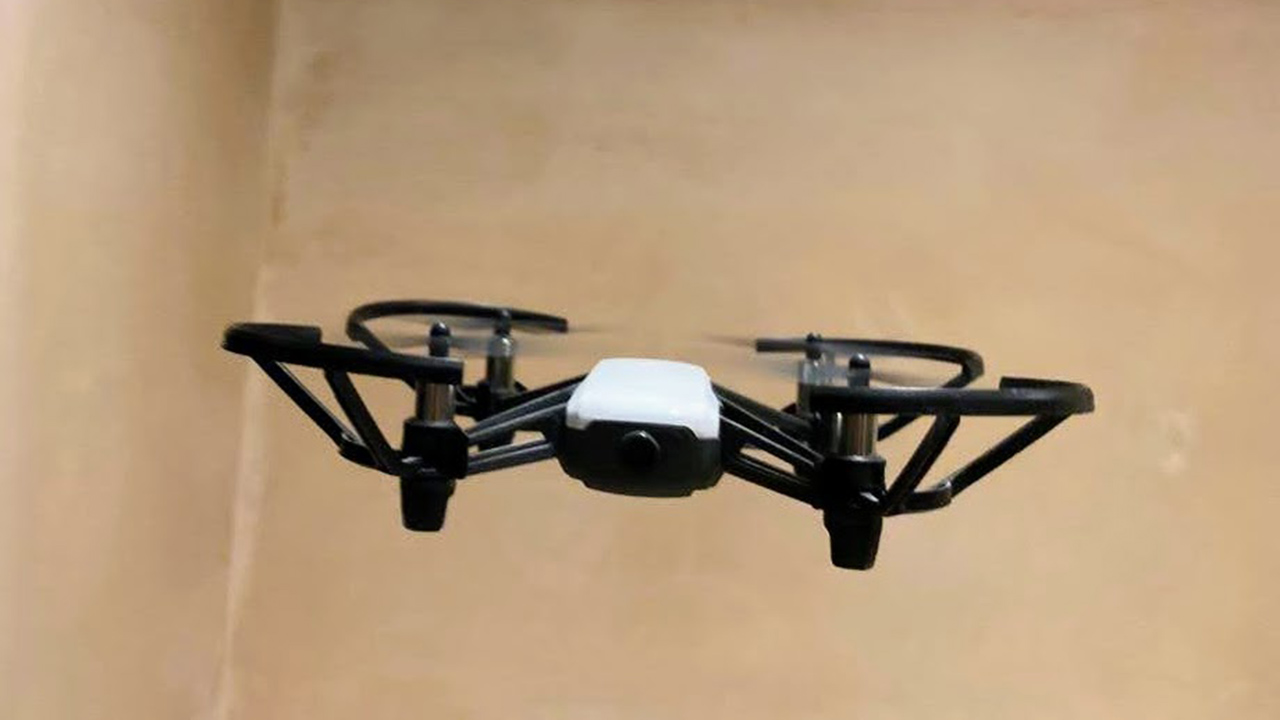
The answer is yes. If you are a beginner drone pilot, on a tight budget or simply enjoy flying drones and want something to practice with that you won’t be too worried about crashing or all of the above then yes! The Tello is definitely a good buy. OK, so its camera isn’t in the same league as more pricey drones and is relatively small with quite a low flight time and range. But this is what keeps the price so low and makes it pretty much a bargain introduction to the world of Drone flying.
However if you are a bit more experienced then maybe this product isn’t for you. Instead you may wish to consider the DJI Mini 2, which is a good bet If you’re looking for a drone that is good for photography and film with a 4K camera but slightly more capable in terms of distance/flight time and still at a reasonable price.
For more high end aerial photography/cinematic videography, the DJI Mavic 3 is a better option. If you are feeling the need for speed and hair-raising aerobatics then the DJI FPV will satisfy your need for thrills.
Myles Cummings has been flying drones since 2017. Originally a trained architect he now enjoys aerial photography of architecture as much as designing it. He is looking forward to the time when international travel is straightforward again. Still on his bucket list of must drone spots is The Millau Viaduct Bridge and the Louvre Abu Dhabi.
